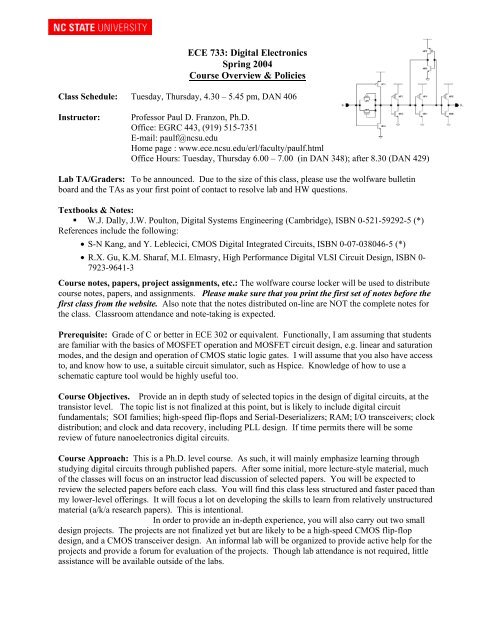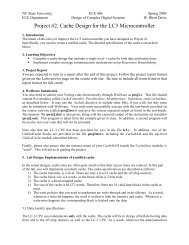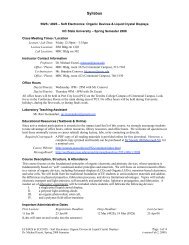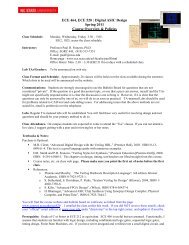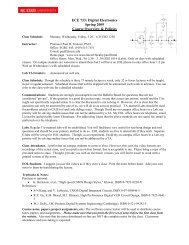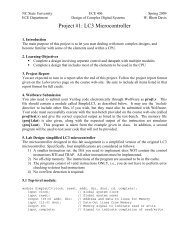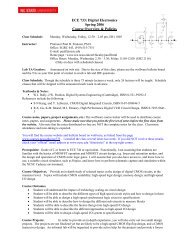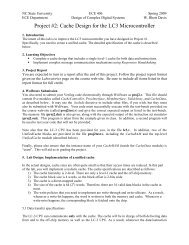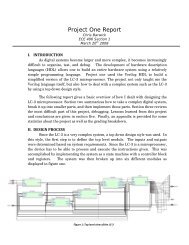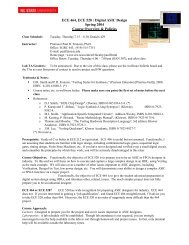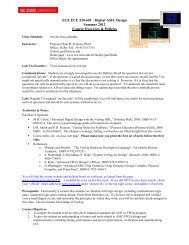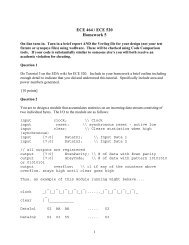ECE 733: Digital Electronics Spring 2004 Course Overview & Policies
ECE 733: Digital Electronics Spring 2004 Course Overview & Policies
ECE 733: Digital Electronics Spring 2004 Course Overview & Policies
You also want an ePaper? Increase the reach of your titles
YUMPU automatically turns print PDFs into web optimized ePapers that Google loves.
<strong>ECE</strong> <strong>733</strong>: <strong>Digital</strong> <strong>Electronics</strong><br />
<strong>Spring</strong> <strong>2004</strong><br />
<strong>Course</strong> <strong>Overview</strong> & <strong>Policies</strong><br />
Class Schedule: Tuesday, Thursday, 4.30 – 5.45 pm, DAN 406<br />
Instructor: Professor Paul D. Franzon, Ph.D.<br />
Office: EGRC 443, (919) 515-7351<br />
E-mail: paulf@ncsu.edu<br />
Home page : www.ece.ncsu.edu/erl/faculty/paulf.html<br />
Office Hours: Tuesday, Thursday 6.00 – 7.00 (in DAN 348); after 8.30 (DAN 429)<br />
Lab TA/Graders: To be announced. Due to the size of this class, please use the wolfware bulletin<br />
board and the TAs as your first point of contact to resolve lab and HW questions.<br />
Textbooks & Notes:<br />
� W.J. Dally, J.W. Poulton, <strong>Digital</strong> Systems Engineering (Cambridge), ISBN 0-521-59292-5 (*)<br />
References include the following:<br />
• S-N Kang, and Y. Leblecici, CMOS <strong>Digital</strong> Integrated Circuits, ISBN 0-07-038046-5 (*)<br />
• R.X. Gu, K.M. Sharaf, M.I. Elmasry, High Performance <strong>Digital</strong> VLSI Circuit Design, ISBN 0-<br />
7923-9641-3<br />
<strong>Course</strong> notes, papers, project assignments, etc.: The wolfware course locker will be used to distribute<br />
course notes, papers, and assignments. Please make sure that you print the first set of notes before the<br />
first class from the website. Also note that the notes distributed on-line are NOT the complete notes for<br />
the class. Classroom attendance and note-taking is expected.<br />
Prerequisite: Grade of C or better in <strong>ECE</strong> 302 or equivalent. Functionally, I am assuming that students<br />
are familiar with the basics of MOSFET operation and MOSFET circuit design, e.g. linear and saturation<br />
modes, and the design and operation of CMOS static logic gates. I will assume that you also have access<br />
to, and know how to use, a suitable circuit simulator, such as Hspice. Knowledge of how to use a<br />
schematic capture tool would be highly useful too.<br />
<strong>Course</strong> Objectives. Provide an in depth study of selected topics in the design of digital circuits, at the<br />
transistor level. The topic list is not finalized at this point, but is likely to include digital circuit<br />
fundamentals; SOI families; high-speed flip-flops and Serial-Deserializers; RAM; I/O transceivers; clock<br />
distribution; and clock and data recovery, including PLL design. If time permits there will be some<br />
review of future nanoelectronics digital circuits.<br />
<strong>Course</strong> Approach: This is a Ph.D. level course. As such, it will mainly emphasize learning through<br />
studying digital circuits through published papers. After some initial, more lecture-style material, much<br />
of the classes will focus on an instructor lead discussion of selected papers. You will be expected to<br />
review the selected papers before each class. You will find this class less structured and faster paced than<br />
my lower-level offerings. It will focus a lot on developing the skills to learn from relatively unstructured<br />
material (a/k/a research papers). This is intentional.<br />
In order to provide an in-depth experience, you will also carry out two small<br />
design projects. The projects are not finalized yet but are likely to be a high-speed CMOS flip-flop<br />
design, and a CMOS transceiver design. An informal lab will be organized to provide active help for the<br />
projects and provide a forum for evaluation of the projects. Though lab attendance is not required, little<br />
assistance will be available outside of the labs.
Student Evaluation. You will be evaluated as follows:<br />
� Homeworks. There will be a small number of homeworks to force review of specific issues.<br />
(20%)<br />
� Midterm. (20%)<br />
� Projects. You will be individually graded on two small projects. Each project is worth 20% of<br />
the grade. (40%).<br />
� Final exam. On material covered since the midterm. (20%)<br />
Midterm Exam March 6 In class<br />
Final Exam Thursday, May 6 1-4 pm<br />
Collaboration are encouraged on the homeworks and projects but you are expected to turn in individual<br />
solutions and reports. The exams will be open-book, open-notes, multiple-choice exams.<br />
Important Dates<br />
o No class on April 8<br />
o <strong>Spring</strong> Break : March 8-12.<br />
o Last day to drop : March 19<br />
o Last class : April 29<br />
Instructor Research Interests<br />
o Interconnect, including transceivers, electronic packaging, on-chip interconnect, optical &<br />
electronic interconnect, network switch ICs, MEMS-based interconnect.<br />
o Circuit design, including low-power, SOI, moletronic circuits<br />
o Sample projects:<br />
o AC Coupled Interconnect<br />
o On-chip interconnect design<br />
o Ultra-low power, low-noise SOI radio baseband circuits and architectures<br />
o Switch architectures for next generation optical networks<br />
o Molecular circuit design and construction<br />
Students with disabilities<br />
Reasonable accommodations will be made for students with verifiable disabilities. In order to take<br />
advantage of available accommodations, students must register with Disability Services for Students at<br />
1900 Student Health Center, Campus Box 7509, 515-7653.<br />
http://www.ncsu.edu/provost/offices/affirm_action/dss/ For more information on NC State's policy on<br />
working with students with disabilities, please see<br />
http://www.ncsu.edu/provost/hat/current/appendix/appen_k.html<br />
Academic integrity<br />
All the provisions of the code of academic integrity apply to this course. In addition, it is my<br />
understanding and expectation that your signature on any test or assignment means that you neither gave<br />
nor received unauthorized aid.


